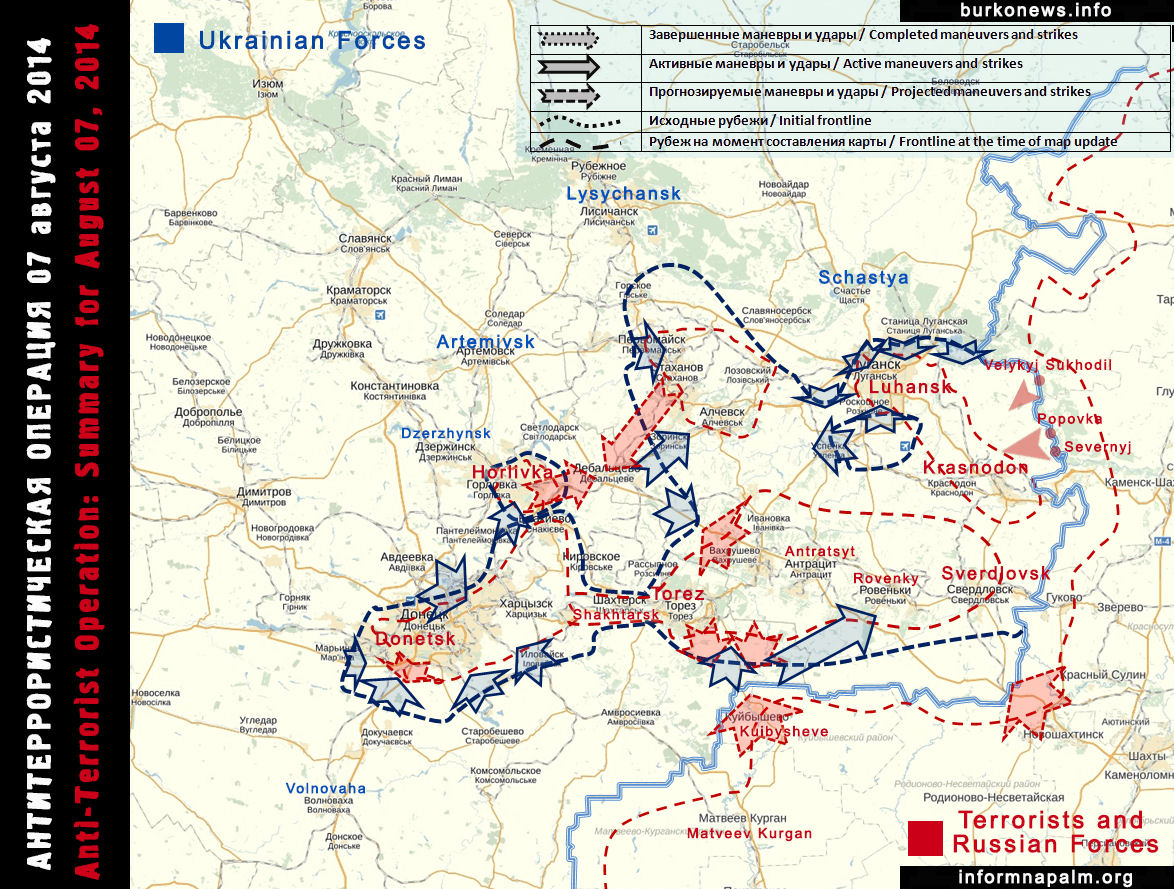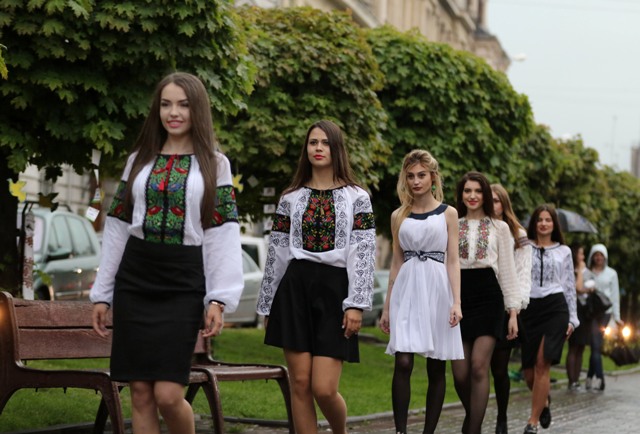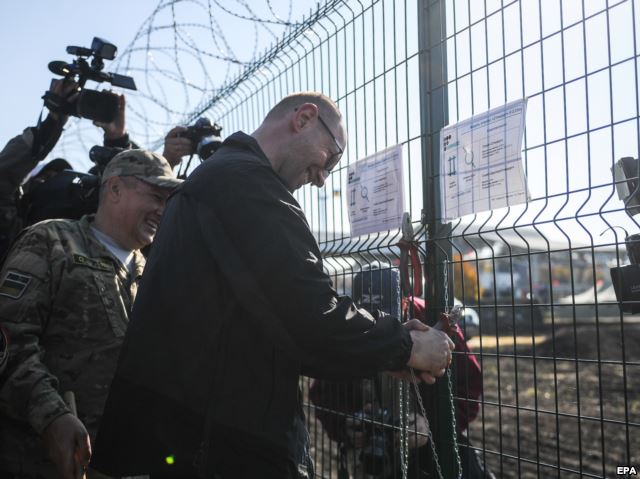By Roman Burko
Terrorists continue to build up their forces in Snizhne, Luhansk, Alchevsk, Stakhanov and Donetsk. The build up of armored vehicles, namely, tanks indicates an accumulation of the attack forces outside the city limits. The First Chechen War showed Russia that the use of tanks in a city is not effective.
In the near future we can expect attacks against the Ukrainian forces in the area of Dmytrivka and Marynivka. The attack itself will be from the area of Zalisne (located between Snizhne and Miusynsk). The attack is likely to be aimed at the Snizhne – Manuilivka – Petrovske – Donetskyi Kriazh – Marynivka. And if “by accident” there are some groupings of Armed Forces of Ukraine in that area, the situation will be similar to the incident in Chervonopartyzansk. We have repeatedly pointed out about the need to destroy transportation links used by the terrorists. It is necessary to demolish all bridges over the Horikhova river in the area of Manuilivka in order to cut off reinforcements from Snizhne. It should be noted that the terrorists have up to 50 tanks in Snizhne. The terrain in that area is difficult to traverse, there are many rivers; all these are enough to create a barrier against heavy armored vehicles. However, this is only of current importance if the enemy still has not settled in the Donetskyi Kriazh Reserve. Judging by the fact that the Ukrainian forces had to withdraw from the top of Savur-Mohyla, it is most likely that the terrorists have already settled down there. [By the way, this night (7th) an attack in one of the directions we had written about began].
Donetsk
As for Donetsk the artillery duels continue. The Ukrainian forces try to hit terrorist targets located far away from the residential areas. The terrorists in response to the Ukrainian forces shell residential areas as well. Perhaps this is done on purpose so that during the next “briefing” no one has doubts as to the humanitarian catastrophe in the region.
The terrorists continue to accumulate their forces in the Mariupol direction that is where the possibility of a counter-attack towards the sea remains quite high. The only good news is that the Ukrainian forces do not try to enter the city from the direction of Marinka anymore. Perhaps they started to regroup towards more threatened directions.
Ukrainian forces are not very active in the north of Donetsk. It really does not make sense to continue the attack on Yasynuvata and further stretching into a narrow corridor between Horlivka and Donetsk until the problem with Makiivka and Khartsyzk is solved. The reason is that the terrorists could easily thrust forward, cutting off the attack group in that corridor. We are now waiting until the command is ready for an attack from Debeltseve towards Yenakiyeve and then further towards Makiivka. The terrorists are most likely waiting for the same judging by the fact that the artillery in the morning began to work from Donetsk toward Makiivka. They are either zeroing in their artillery for the future, or are panicking and think that the Ukrainian forces are on the offensive there already.
Finally we should note that the composition of the terrorists has changed, residents say they see new characters in the streets.
Horlivka
The situation with Horlivka is not that simple. A large number of field roads between Horlivka and nearby settlements enables terrorists forces to move secretly and attack by the Ukrainian Forces by surprise.
Pervomaisk / Stakhanov
Pervomaisk remains unassailable, terrorists constantly counter-attack toward Popasna. Such counterattacks draw off parts of the Ukrainian forces from other directions (for example, Shakhtarsk). Besides, the terrorists continue to accumulate their forces in Stakhanov. We wrote about headquarters reserves in our summary yesterday. The possibility of attack on Debaltseve from Brianka and Alchevsk (a fairly large grouping of terrorist forces is located there) remains high.
Luhansk
New reinforcements (both manpower and military equipment) have arrived here from the Russian town of Donetsk (Rostov region). The terrorists are resisting the Ukrainian forces advance from the northern direction and from time to time they also shell the Lutuhyne grouping of the Ukrainian forces. We have previously noted that the availability of road networks between Shchastia and Luhansk via Malynske forest can lead to encirclement of the forces advancing on Luhansk from the north. We do not deny that this idea looks quite daring but do not forget that the Ukrainian forces are waging war on irregular armed groups whose tactics are often unexpected maneuvers. Taking into account the terrain on the right bank of the river Donets, we can expect surgical strikes aimed at the rear of the attacking Ukrainian forces.
A Concluding Comment
We are often asked why we so rarely please our readers with good news, and why our forecasts are always quite skeptical. We believe that while the war is going on in the East and most of Ukraine still does not feel the full responsibility for the future and the freedom of Ukraine, it is inappropriate to dream about an imminent quick victory. Instead, it is high time to finally realize that we are waging war not against a bunch of a rabble terrorizing the cities in the East but with specially trained mercenaries who are supplied with weapons, equipment and reinforcements from the Russian Federation. The fine line between the full-scale invasion and constant reinforcements almost vanishes. Does it make any difference if the terrorist firing at you has a military card proving that they serve in the Armed Forces of Russia or not? The result is the same, our freedom and independence are encroached upon and we must respond to this encroachment with lightning speed, and directly, by mobilizing all efforts. The stake in this war is much higher than just life, the stake is the future of our children.
[hr]Source: burkonews.info, edited by Larry Field, edited by Myron Spolsky







